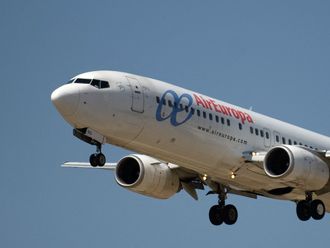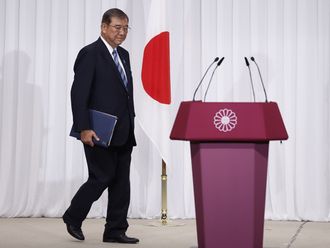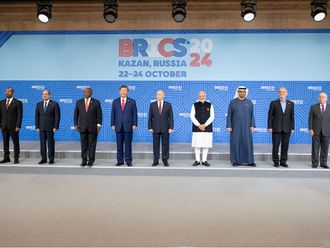When citizens throughout the Mena (Middle East and North Africa) region are asking for political change, Iran's systematic oppression of an estimated eight million Ahwazi Arabs should not be allowed to continue unchallenged.
The territory of Al Ahwaz — known as Khuzestan in Iran — stretches between the Zagros Mountains to the north and the east, Iraq in the West and Kuwait in the south. It is blessed with vast deposits of oil and gas as well as agricultural land, yet its Arab population is overwhelmingly poor and illiterate.
Tehran has discriminated against the Arabs of Al Ahwaz since their homeland's occupation and annexation by the Shah; they are being treated as third-class citizens, abandoned to primitive living standards and without even the basic political rights.
The Director of the Ahwaz Education and Human Rights Foundation, Karim Abdian, highlighted the Ahwazi plight in the UN. He explained that the Ahwazi population suffers from a shortage of drinking water, electricity, plumbing, telephone and sewage. Fifty per cent live in absolute poverty, while some 80 per cent of children are malnourished.
The dispossessed Ahwazi Arabs are under-represented in parliament and accuse the Iranian government of racially-based political and economic prejudice, which is why some groups are calling for Al Ahwaz to be liberated and recognised as an independent Arab state. However, the government is attempting to manipulate demographics by setting-up self-contained farming settlements and bringing in Persians to work there.
According to Amnesty International, "Land expropriation by the Iranian authorities is reportedly so widespread that it appears to amount to a policy aimed at dispossessing Arabs of their traditional lands…"
It is believed that the government is also trying to eradicate the Ahwazi culture. Iranian authorities will not register birth certificates to Arab new-borns unless they assume Persian names. Schools in Al Ahwaz are barred from teaching Arabic, which is also banned from parliament and ministries. Arabic media is forbidden in the territory. Journalists who write against this cultural barbarism are routinely imprisoned.
In 2007, six Ahwazi Arabs were subjected to kangaroo courts and put on death row on charges of converting to Sunni Islam, giving their children Sunni names, flying the all-white Ahwazi Arab flag, and as "enemies of God". Those and similar rigged trials have been condemned by the European Union, the UN and numerous human rights organisations.
The historic claim of the Ahwazi Arabs to their Arab homeland is solid. Al Ahwaz was once a thriving province of Mesopotamia known for its Muslim scholars, poets and artists. From the mid-7th century until the mid 13th century, its people were ruled variously by Umayyad and Abbasid caliphs, their numbers swelled by Arab tribes from the Arabian Peninsula. A Mongol-invasion devastated most of Al Ahwaz that was later occupied by the founder of the Timurid Empire Tamerlane and his successors until the early 16th century when it fell to the Persian Safavid Dynasty.
Al Ahwaz came to be known as the semi-autonomous region of ‘Arabistan' towards the end of the 16th century when it received an influx of Arab tribes from southern Iraq as well as a clan of the powerful Bani Ka'ab with origins in Central Arabia.
Led by Shaikh Jabir Al Ka'abi, the Bani Kaab fought to stave-off British and Ottoman invasions. Shaikh Jabir was a wise governor who established law and order and turned the coastal city of Mohammerah into a bustling free port. On the cusp of 20th century, oil was discovered around Mohammerah when the British founded the Anglo-Persian Oil Company and entered into an oil exploration treaty with Shaikh Jabir's son Khaz'al. The UK guaranteed Arabistan's security and agreed payments to both Shaikh Khaz'al and the Shah of Iran.
A curse
What should have been a blessing for the Ahwaz Arabs was a curse. When Shaikh Khaz'al realised that Reza Shah's ambitions extended to Arabistan's oil wealth, he asked the British to defend the Ahwazi people and back their homeland's independence as an Arab state. Forced to choose, Britain reneged on its treaty with Khaz'al and supported the Shah.
Betrayed by the UK, in 1924, Khaz'al put his case before the League of Nations, but it was rejected. Given that Persia's membership of the League of Nations was prior to its annexation of Arabistan and Tehran was, therefore, bound by that body's rules prohibiting invasion, that decision should be reconsidered.
With Britain's help, Reza Shah gained absolute control over the territory when he changed its name to Khuzistan. From 1928 to 1946 there were nine unsuccessful Ahwazi uprisings and since numerous secessionist groups have emerged, written-off by Tehran as stooges of foreign countries. Today, Al Ahwaz produces four million barrels of oil a day — 87 per cent of Iran's oil production — but the indigenous population profits little from its revenue in terms of employment, infrastructure and welfare.
Eight million Ahwaz Arabs may possess Iranian documents, but they're not Persians. They have as much Arab blood flowing through their veins as nationals of GCC states. I would, therefore, request Arab countries to call upon the Arab League to put their right of self-determination before the UN Security Council. Their abandonment is nothing less than a stain upon the Arab Nation to which the Arabs of Arabistan proudly belong.
Khalaf Al Habtoor is a businessman and chairman of Al Habtoor Group.








